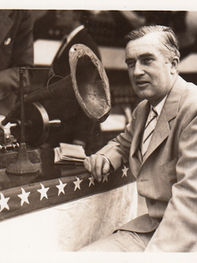Who was Charles Edison?

A son of Thomas Alva Edison, Charles Edison was Secretary of the Navy, Governor of New Jersey and a nationally recognized corporate executive. He died July 31, 1969, three days shy of his seventy-ninth birthday.
The Charles Edison Fund
What is now the Charles Edison Fund was incorporated by Mr. Edison on March 3, 1948 as The Brook Foundation (the "Brook").
His choice of the name was prompted by his recollection of a Sunday School song from the days of his childhood. Written by Lucy Wheelock, a pioneer in kindergarten education, the song carried these words:
"Give, said the little brook,
Give, oh give - give, oh give
Give, said the little brook,
Oh give, oh give away
I am little I know, but wherever I go.
The fields grow greener still.”
Charles Edison's Career
Probably the most accomplished and successful of Edison's children, attended Massacusetts Institute of Technology (MIT). He became president of his father’s company, Thomas A. Edison, Incorporated, in 1927. He ran the company until it was sold in 1959.
However, Charles is the best known for his career in public service. In the mid-1930s he served in the cabinet of President Franklin Roosevelt– Acting Secretary of the navy. New Jersey voters elected him as their governor in 1940. He proposed an updated state constitution for the state, but voters rejected it in a statewide referendum. However, his work inspired later New Jersey legislators to pass a modern constitution after Edison’s governorship.
Charles Edison's Charitable Efforts
Mr. Edison was fifty-eight when he created his foundation. Motivating this action was his desire to disassociate insofar as possible his personal philanthropies from the vagaries of year-to-year fluctuations in the economy which, almost invariably in the past, had influenced his level of giving to the many deserving causes to which he was a contributor. This was no idle fancy on his part because, virtually simultaneously, he instituted a similar system within Thomas A. Edison, Incorporated, the company he headed and of which he was the majority stockholder.
Charles Edison's Theory and Goals
Since organizations dependent on charitable contributions have budgetary problems comparable to those confronting individuals and for-profit corporations, it is equally important for recipient charities to be able to estimate annual levels of giving by their benefactors. Mr. Edison, therefore, decided he would build up a surplus in the Fund, funnel much of his personal philanthropies through it, and thereby make it possible to maintain his level of giving in bad as well as good years.
This was his short-range goal. His long-range goal, however, was that of creating an institution capable of carrying on after his passing. A childless widower at the time of death, Mr. Edison bequeathed the bulk of his multi-million-dollar estate to the Fund.
In addition to assisting other qualified organizations financially, the Fund operates substantial public sector programs on its own.





